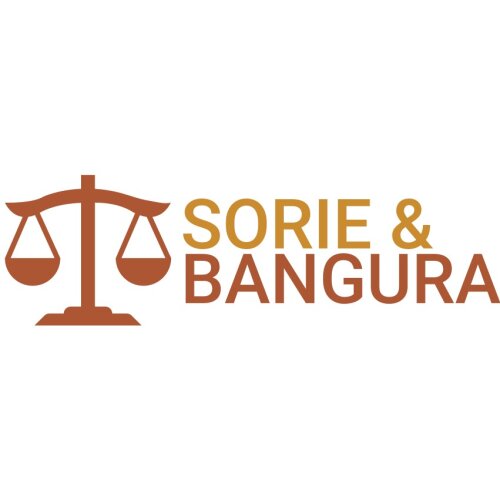Best Project Finance Lawyers in Freetown
Share your needs with us, get contacted by law firms.
Free. Takes 2 min.
List of the best lawyers in Freetown, Sierra Leone
About Project Finance Law in Freetown, Sierra Leone
Project finance involves funding large infrastructural or industrial projects, such as power plants, mining operations, or transportation networks, primarily through debt that is repaid from the cash flow generated by the project. In Freetown, Sierra Leone, project finance plays a key role in economic development and is increasingly important as the nation rebuilds and expands its infrastructure. Legal specialists in this field assist with structuring transactions, risk allocation, regulatory compliance, and documentation to ensure that projects are both financially viable and legally sound.
Why You May Need a Lawyer
Engaging a lawyer who specializes in project finance is crucial for a variety of reasons. Key situations where legal help may be needed include:
- Negotiating project finance agreements with international or domestic lenders and investors.
- Structuring public-private partnerships (PPPs) and understanding government concessions.
- Complying with local and international regulations, including environmental, tax, and procurement laws.
- Securing land rights and permits necessary for project development.
- Advising on risk mitigation strategies, such as insurance and guarantees.
- Protecting against potential project disputes or defaults.
- Reviewing and drafting complex project documentation, including loan agreements, shareholder agreements, and construction contracts.
A knowledgeable lawyer can help protect your interests throughout the project lifecycle, from inception and financing to construction and operation.
Local Laws Overview
Project finance transactions in Freetown are subject to a combination of local statutes, regulations, and international best practices. Some key areas include:
- Investment Promotion Act: This law governs incentives and requirements for foreign and domestic investment, often relevant for large-scale projects.
- Public Procurement Act: Governs how government contracts, concessions, and public-private partnerships are awarded and executed.
- Land Act and Land Policy: Regulates land ownership, leasing, and usage, which is a frequent consideration for project financing.
- Companies Act: Sets out legal requirements for establishing and operating business entities that typically sponsor projects.
- Environmental Protection Laws: Projects must obtain environmental permits and comply with regulations enforced by the Environmental Protection Agency Sierra Leone (EPA-SL).
- Sector-Specific Laws: Laws regulating energy, mining, transportation, water, and other sectors often contain project-specific rules and licensing provisions.
- Central Bank Regulations: The Bank of Sierra Leone regulates foreign exchange controls and financial transactions in cross-border project finance deals.
It is essential to work with professionals who understand how these overlapping legal and regulatory frameworks apply to your specific project.
Frequently Asked Questions
What is project finance and how does it work in Sierra Leone?
Project finance is a funding method for large projects where repayment comes primarily from the cash flow generated by the project itself. In Sierra Leone, it typically involves lenders, project sponsors, government bodies, and often international investors working within local laws to structure deals for infrastructure and industrial developments.
Why is legal advice necessary when considering project finance?
Legal advice ensures that all agreements comply with Sierra Leone law, risks are identified and allocated appropriately, and your interests are protected throughout each phase of the project.
What are the typical legal structures used in project finance in Freetown?
Common structures include Special Purpose Vehicles (SPVs) or project companies, joint ventures, and partnerships, each offering specific benefits for ring-fencing project assets and liabilities.
Are there restrictions on foreign ownership or investment in project finance deals?
There are generally no outright bans on foreign participation, but certain strategic sectors may have additional requirements or restrictions. It is important to verify with local authorities and legal counsel.
What permits and licenses are usually required for project finance projects?
Permits typically include business registration, land use permissions, sector-specific licenses, and environmental permits issued by regulatory authorities.
How are risks typically managed in project finance?
Risks are managed and allocated using contractual agreements, insurance, guarantees, and sometimes government support. Lawyers help identify and mitigate these risks.
What government agencies are involved in project finance in Sierra Leone?
Relevant agencies may include the Ministry of Finance, the Ministry responsible for the project sector (such as Energy or Transport), the National Public Procurement Authority, and the Environmental Protection Agency.
Is local partnership mandatory for foreign investors in project finance?
While not always mandatory, partnerships with local firms can be beneficial and sometimes required by sector-specific regulations. Legal advice is recommended to clarify obligations.
What happens in case of a dispute in a project finance transaction?
Dispute resolution mechanisms are typically built into contracts and may include local courts, arbitration, or mediation, depending on the agreement.
Can profits or loan repayments be repatriated from Sierra Leone?
With the proper approvals from the Bank of Sierra Leone and compliance with foreign exchange regulations, capital and profit repatriation is generally permitted.
Additional Resources
Individuals and businesses seeking more information on project finance in Freetown can contact the following:
- Sierra Leone Investment and Export Promotion Agency (SLIEPA): Provides investment facilitation and guidance.
- National Public Procurement Authority (NPPA): Oversees public procurement and PPPs.
- Environmental Protection Agency Sierra Leone (EPA-SL): Issues environmental clearances and monitors compliance.
- Bank of Sierra Leone: Regulates foreign exchange and financial transactions.
- Ministry of Finance: Involved in large project budgets and government guarantees.
- The Sierra Leone Bar Association: Directory of qualified legal practitioners including project finance specialists.
Additionally, consulting with professional project finance lawyers and financial advisors with experience in Sierra Leone is strongly recommended.
Next Steps
If you require legal guidance regarding project finance in Freetown, consider the following steps:
- Clearly define the nature and scope of your project, including desired outcomes and partners.
- Consult with experienced project finance lawyers who understand both the local market and international standards.
- Gather all relevant documents, such as business plans, financial models, and proposed contracts, for review.
- Contact relevant governmental agencies for sector-specific advice or regulatory requirements.
- Ensure open communication with all stakeholders, including investors and local authorities.
- Stay updated on ongoing legal or regulatory developments that may impact your project.
Taking early and informed action will help minimize risks, ensure compliance, and improve your chances of project success in Freetown, Sierra Leone.
Lawzana helps you find the best lawyers and law firms in Freetown through a curated and pre-screened list of qualified legal professionals. Our platform offers rankings and detailed profiles of attorneys and law firms, allowing you to compare based on practice areas, including Project Finance, experience, and client feedback.
Each profile includes a description of the firm's areas of practice, client reviews, team members and partners, year of establishment, spoken languages, office locations, contact information, social media presence, and any published articles or resources. Most firms on our platform speak English and are experienced in both local and international legal matters.
Get a quote from top-rated law firms in Freetown, Sierra Leone — quickly, securely, and without unnecessary hassle.
Disclaimer:
The information provided on this page is for general informational purposes only and does not constitute legal advice. While we strive to ensure the accuracy and relevance of the content, legal information may change over time, and interpretations of the law can vary. You should always consult with a qualified legal professional for advice specific to your situation.
We disclaim all liability for actions taken or not taken based on the content of this page. If you believe any information is incorrect or outdated, please contact us, and we will review and update it where appropriate.












